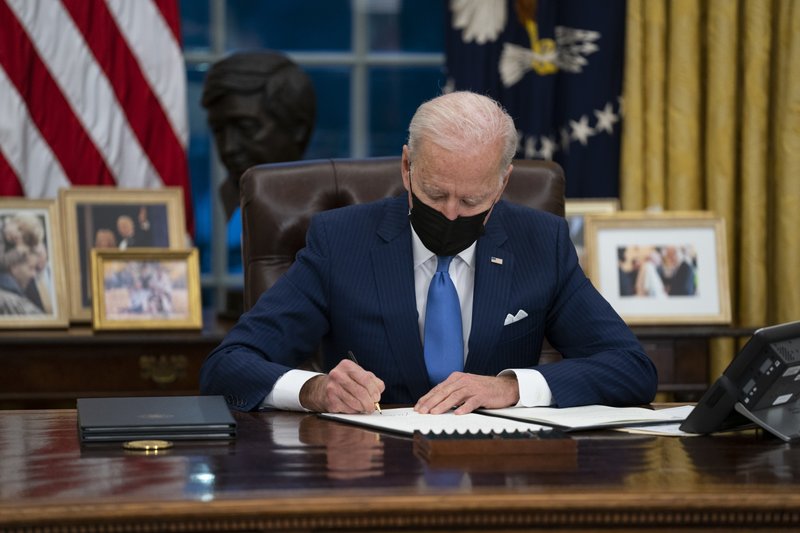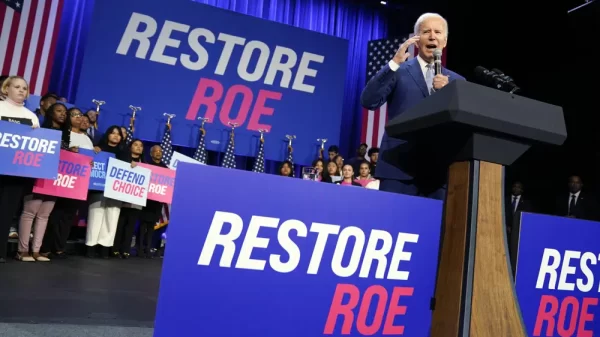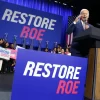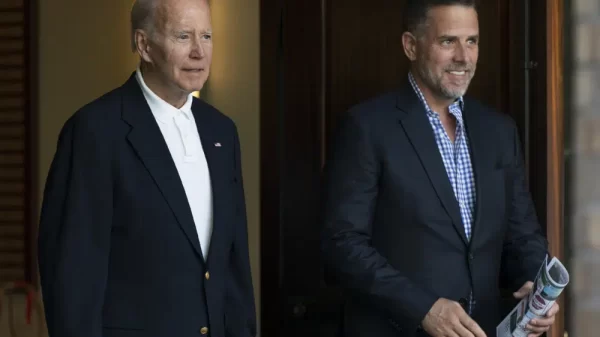FILE – In this Feb. 2, 2021, file photo, President Joe Biden signs an executive order, in the Oval Office of the White House, in Washington. Biden is signing an executive order Wednesday to review the United States’ supply chains for large capacity batteries, pharmaceuticals, critical minerals and semiconductors. (AP Photo/Evan Vucci, File)
WASHINGTON (AP) — President Joe Biden is preparing to sign an executive order to review U.S. supply chains for large-capacity batteries, pharmaceuticals, critical minerals and semiconductors that power cars, phones, military equipment and other goods.
The United States has become increasingly reliant on imports of these goods — a potential national security and economic risk that the Biden administration hopes to address with the planned 100-day review and the possibility of increased domestic production, according to administration officials who insisted on anonymity to discuss the order. However, Biden will also look to work with international partners to ensure a stable and reliable supply chain.
The order being signed Wednesday will include sectoral reviews to be completed within one year for defense, public health and biological preparedness, information communications technology, energy, transportation and food production.
Over the past year, the fragility of vital supply chains has been revealed repeatedly. The coronavirus outbreak led to an initial shortage of masks, gloves and other protective medical equipment. Automakers in the United States and Europe are now dealing with a shortage of computer chips.
Administration officials have met with automakers and are talking with foreign counterparts on how to boost supplies in the short term. But there is no magic bullet to immediately fixing the lack of semiconductors for automakers, an administration official said.
The chip shortage is indicative as to why Biden is trying to be proactive with the reviews, so that they can strengthen the supply chains to prevent additional challenges from emerging. Administration officials say that they plan to partner with industry and members of Congress as part of the effort and that no tool is off the table, including the use of the Defense Production Act.
Nearly every major automaker that produces vehicles in the U.S. has cut production because of the shortage by canceling shifts, slowing assembly line speeds or temporarily closing factories. Most automakers have tried to limit the cuts to slower-selling vehicles.
But the shortage has forced the Ford Motor Co. to at times cancel shifts at two plants that make the F-Series pickup truck, the top-selling vehicle in the nation. Besides Ford, Stellantis (formerly Fiat Chrysler), General Motors, Toyota and Honda have had to slow production.
Some are building vehicles without computer chips, which control engines, brakes, transmissions and other tasks, so they can be installed once more semiconductors are available.
The chip shortage has cost the global auto industry the production of about 1 million vehicles, according to IHS Markit. The analytics firm expects the chip crisis to hit bottom toward the end of March, with supplies constrained into the third quarter.
IHS Markit expects the lost production could be made up later in the year. But the shortage could compound already tight vehicle inventories in the U.S., driving up prices that rose when factories were closed last year due to the novel coronavirus.
Moody’s predicts that the chip shortage will cost Ford and General Motors about one-third of their pretax earnings this year. It also expects electric vehicle maker Tesla to be affected, although less than GM and Ford.
The U.S. Semiconductor Industry Association says the country’s share of global chip manufacturing capacity has dropped from 37% in 1990 to 12% today. The association wants Washington to fund domestic semiconductor manufacturing and research and pass an investment tax credit to help build and modernize chip factories in the U.S.
The wrangling over semiconductors dovetails with China’s economic rise as it became a manufacturing center for electronics. Chinese companies began to account for half of global semiconductor consumption in 2012, and demand has grown as China makes 90% of all smartphones, 67% of all smart televisions and 65% of all personal computers, noted a 2020 research paper by Chad Bown, a senior fellow at the Peterson Institute for International Economics.
Copyright 2020 Associated Press. All rights reserved.










































